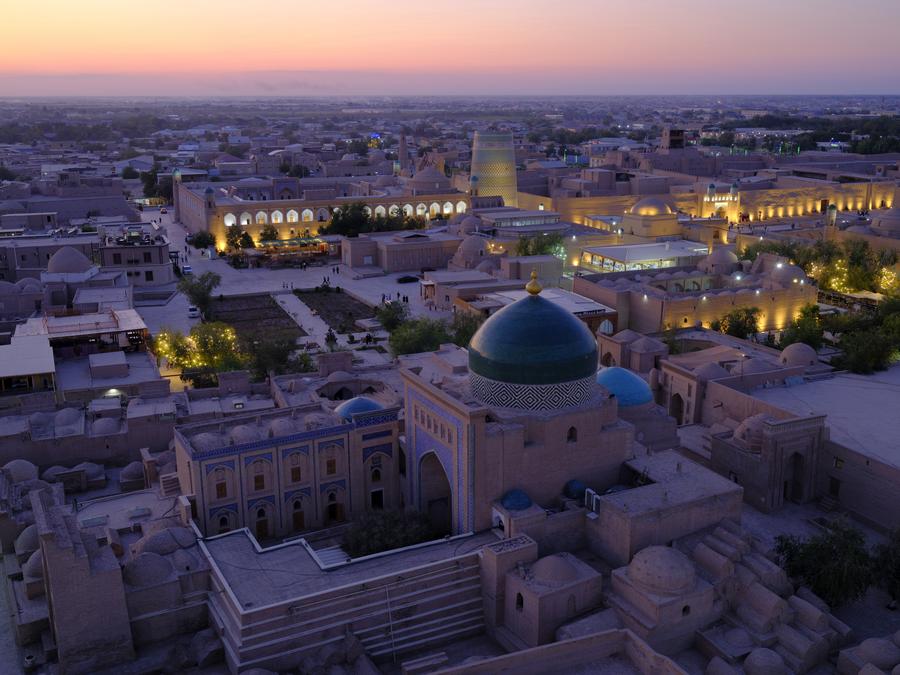
The history of relations between the Uzbek and Chinese peoples, like the history of the Silk Road, spans a couple of millenniums. Today, Sino-Uzbek ties are developing in line with contemporary realities, not least because the two sides share similar views on cooperation, and regional and international issues.
Ancient chronicles testify that diplomatic relations with states located in present-day Uzbekistan were established way back in the second half of the 2nd century BCE, with the ancient Silk Road playing a key role in the development of such relations. In particular, they mention the arrival of the envoy of the Western Han Empire, Zhang Qian, in Davan.
READ MORE: China-Central Asia Spirit forged
Sino-Uzbek diplomatic relations were established on the basis of the Five Principles of Peaceful Coexistence: mutual respect for sovereignty and territorial integrity, mutual nonaggression, non-interference in each other's internal affairs, equality and mutual benefit, and peaceful coexistence. Since then, despite the complex global situation and geopolitical unpredictability, the friendship between the peoples of China and Uzbekistan has continued to grow stronger.
Since Uzbekistan's independence, Sino-Uzbek relations have progressed toward closer cooperation, with the two sides establishing a strategic partnership in June 2012, which was elevated to a comprehensive strategic partnership in June 2016 and a "comprehensive strategic partnership for a new era" in September 2022.
Islam Karimov, the first president of Uzbekistan, visited China several times, while incumbent Uzbek President Shavkat Mirziyoyev paid four visits to China.
At the meetings between the heads of state, both sides consistently emphasized their commitment to deepen their multifaceted relationship. During Mirziyoyev's visit to China in January 2024, the two countries announced to enter a new stage of an "all-weather comprehensive strategic partnership for a new era" — a relationship China shares with only Pakistan and Belarus.
Uzbekistan is interested in developing cultural and humanitarian ties with China, as evidenced in the noticeable increase in cooperation in the fields of science, education and culture between the two countries in recent years. For instance, while student and internship exchanges through official government channels are expanding, overall relations between the two sides are steadily developing and deepening and bilateral trade is rapidly growing.
Trade, economic and investment cooperation between Uzbekistan and China has been deepening, and expanding into new areas in recent years, with China being the top trading partner of and leading investor in Uzbekistan. In 2024, the trade volume between Uzbekistan and China was more than $13.5 billion.
During their meeting on Oct 17, 2023, which marked the 10th anniversary of the Belt and Road Initiative, the leaders of the two countries agreed to increase the bilateral trade volume to $20 billion in the next five years.
Besides, China and Uzbekistan have deepened their cooperation in the fight against poverty through joint programs. Uzbekistan seeks to implement China-like programs to alleviate poverty, particularly in the social and economic fields, and increase employment.
In this context, during Mirziyoyev's visit to Beijing in 2022, the two sides signed a five-year program for trade, economic, and investment cooperation, as well as an agreement on implementing joint measures for studying and applying China's experience in poverty alleviation and anti-corruption efforts. During that meeting, Chinese President Xi Jinping said China is ready to work with Uzbekistan in reducing poverty and deepening cooperation in the security field.
Uzbekistan has been studying China's experiences in poverty reduction, including the methods and policies aimed at improving people's living standards and promoting self-employment. President Xi's book, Up and Out of Poverty, unveiled in Uzbekistan in 2023, states that to fight poverty, we must seek truth from facts, act according to local conditions, provide systematic guidance, and target poverty with precision. More importantly, it emphasizes that a country cannot allow people to remain in poverty while proclaiming the goal of building a moderately prosperous society in all respects.
ALSO READ: Astana Summit forges strong bulwark against increasing global turbulence
In recent years, Uzbekistan, with support from Chinese experts, has achieved significant success in poverty reduction, lowering the poverty rate from 17 percent in 2022 to 8.9 percent by February 2025.
China has always pursued an independent and peaceful foreign policy, developing good-neighborly relations, and mutually beneficial cooperation with neighboring countries, and addressed the root causes of poverty. All these hold strategic significance for Uzbekistan to deepen relations with China, underscoring Uzbekistan's focus on strengthening friendship with and deepening win-win partnerships with its neighbors.
The author is a professor at National University of Uzbekistan.
The views don't necessarily reflect those of China Daily.


